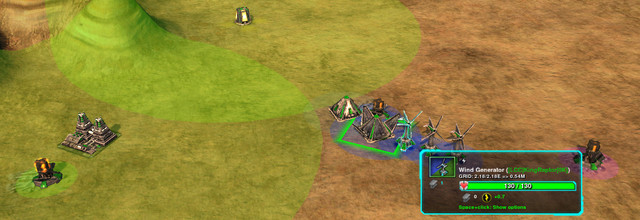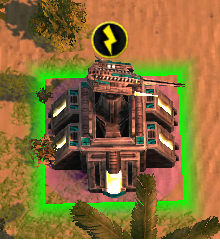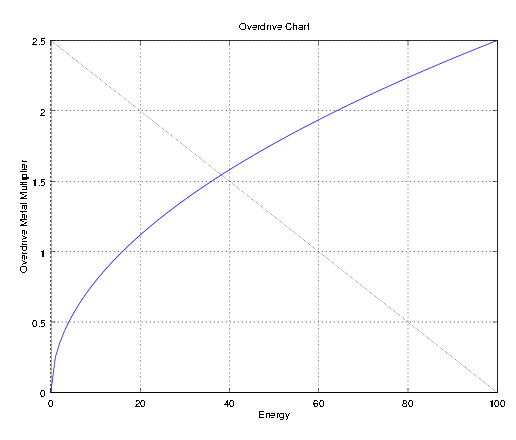Difference between revisions of "Overdrive"
(Equation was cut by a line ender making hard to read properly.) |
|||
| Line 41: | Line 41: | ||
If your mexes are of unequal base income overdrive is a little more complex. As overdrive acts as a multiplier to base income the high income mexes will want to be at a higher multiplier than other mexes even though increasing the multiplier costs more energy. You do not need to worry about reducing your metal income by linking, this can never happen. The overdrive equation has been solved mathematically to always produce the maximum metal income when faced with non-uniform extractor income. | If your mexes are of unequal base income overdrive is a little more complex. As overdrive acts as a multiplier to base income the high income mexes will want to be at a higher multiplier than other mexes even though increasing the multiplier costs more energy. You do not need to worry about reducing your metal income by linking, this can never happen. The overdrive equation has been solved mathematically to always produce the maximum metal income when faced with non-uniform extractor income. | ||
| − | + | Add Grid to chart | |
Higher than average income mexes are important for overdrive; try to capture them and overdrive them as much as possible. These extractors will max their grid at higher overdrive multiplier than others so make sure to keep track of their energy usage. | Higher than average income mexes are important for overdrive; try to capture them and overdrive them as much as possible. These extractors will max their grid at higher overdrive multiplier than others so make sure to keep track of their energy usage. | ||
| Line 50: | Line 50: | ||
This shows the state of a single extractor. X is the base metal income of the extractor. Y% is the extra metal income from overdrive. Z is the energy used by this extractor to produce the extra Y% of income. | This shows the state of a single extractor. X is the base metal income of the extractor. Y% is the extra metal income from overdrive. Z is the energy used by this extractor to produce the extra Y% of income. | ||
Y and Z are always related by <code>Y = sqrt(Z)/4 x 100</code> | Y and Z are always related by <code>Y = sqrt(Z)/4 x 100</code> | ||
| + | |||
| + | [[File:Zero-K_Overdrive_Chart.png]] | ||
:'''E source - Extra Metal: X Energy Y / Z''' | :'''E source - Extra Metal: X Energy Y / Z''' | ||
Revision as of 06:24, 23 January 2018
Overdrive is a way to generate more metal from metal extractors using energy. It uses a grid mechanic that is also required by some powerful defense structures to function.
TLDR
- Circles around metal extractors and energy sources are "overdrive grid"
- Circles have to touch to join into grid
- Unused energy of the grid is used to increase metal production of metal extractors
- Grids can be connected to allies
- The more you "overdrive" given metal extractor the less efficiently it uses the energy
- Some weapons (Annihilator, Doomsday Machine) need to be connected to grid together with enough energy sources to work
Simple rules
- If grid is pink or violet, join energy and metal extractor together, make sure there is enough extra energy in your team
- If grid is light blue or green - keep adding energy
- If grid is yellow or red - expand grid to contain more metal extractors
Explanation of overdrive
You can overdrive metal extractors by connecting them to a pylon grid. Excess energy is used to increase the metal output of the mex.
The pylon grid consists of your energy structures and mexes. Each mex and E structure has an effect field; two structures are linked if their effect fields overlap. Linking econ structures together creates a grid; the energy produced in the grid is the maximum energy that can be used to overdrive all the mexes in the grid.
The overdrive efficiency of a mex decreases as more energy goes into it.
Selecting an economy structure will show the effect fields of all econ structures. The color of the field denotes its efficiency: runs from purple to red as it becomes increasingly inefficient; pink means unlinked. If a structure is disabled for any reason (EMP, for instance), it loses its pylon functionality; the field turns grey to indicate this.

Energy-producing structures and mexes have a small pylon range; chains of solar or wind generators are required to connect distant mexes together. The Energy Pylon structure has a large pylon radius, providing a cheap way to link separate grids together.
Efficiency tips
Overdrive increases your metal income by individually multiplying extractor income based on how much energy each extractor is allocated. The equation is this:
Additional metal == sqrt(energy)/4 x base metal
This equation has diminishing returns. It takes 16 energy initially to double an extractor's income and a further 64 energy (80 in total) to increase the output to triple it's income.
As a result, your metal to energy conversion ratio improves as more mexes are built and added to the grid. For example, 16 energy used on 4 equal mexes will overdrive each mex by 4 energy which is +50% income from each mex; +200% total. If instead you had 1 mex and 16 energy, all 16 energy would be used on that extractor for a +100% the metal income, twice as bad as 4 mexes.
In practice only about half of your extractors need to be linked to an overdrive grid for most games. The cost and risk of linking extra extractors can be too great for the minimal gain of linking an already efficient grid. This efficiency is around 2x to 3x multiplier.
If your mexes are of unequal base income overdrive is a little more complex. As overdrive acts as a multiplier to base income the high income mexes will want to be at a higher multiplier than other mexes even though increasing the multiplier costs more energy. You do not need to worry about reducing your metal income by linking, this can never happen. The overdrive equation has been solved mathematically to always produce the maximum metal income when faced with non-uniform extractor income. Add Grid to chart Higher than average income mexes are important for overdrive; try to capture them and overdrive them as much as possible. These extractors will max their grid at higher overdrive multiplier than others so make sure to keep track of their energy usage.
The tooltips of Metal Extractors have information to display how efficient your overdrive is. For example:
- Metal Extractor - Makes:X + Overdrive: + Y% Energy:Z
This shows the state of a single extractor. X is the base metal income of the extractor. Y% is the extra metal income from overdrive. Z is the energy used by this extractor to produce the extra Y% of income.
Y and Z are always related by Y = sqrt(Z)/4 x 100
- E source - Extra Metal: X Energy Y / Z
This shows the behaviour of the energy grid that the structure is part of. X shows the total extra metal produced due to overdrive in this grid. Y shows the total energy expended to produce this metal. Z shows the energy production of all the energy structures of the grid, Z is the upper bound of Y.
High-energy weapons
Some defense structures also require a connection to a grid in order to function. The grid must have a minimum power output; however, any number of structures can use the same grid.
If a defense structure is not connected to a sufficiently powerful grid, an energy icon will display over it.

| The images and links on this page may be broken at the moment. The cache on this page points to the test wiki.
Please purge the cache to try to restore images and fix those links. This will work only if the page is not on the test server (where this box should appear for now even when cache purging is not needed), which may lack the actual images. This page thinks that it resides on test.zero-k.info right now. |
